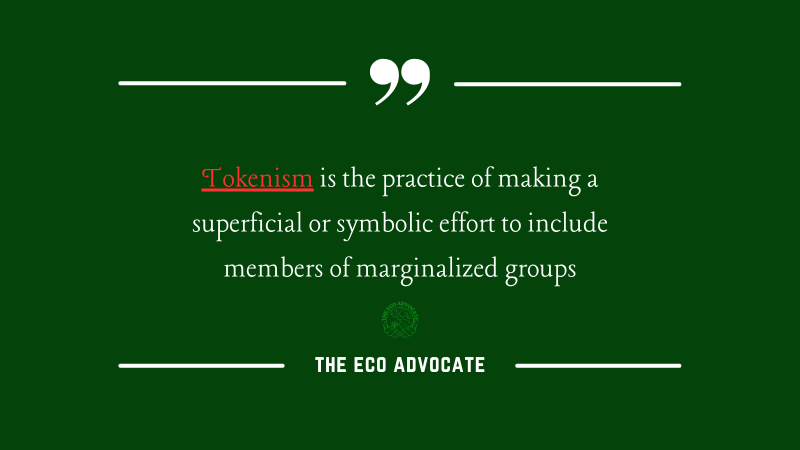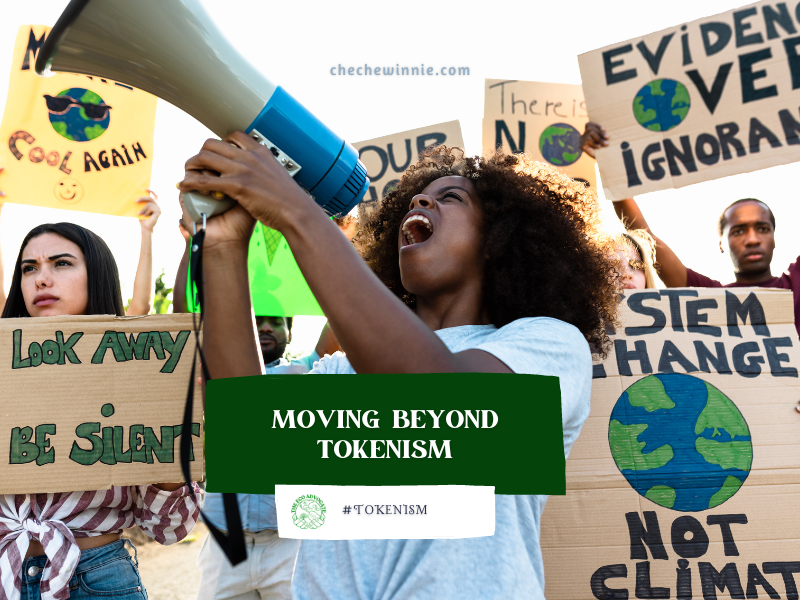Climate change is one of the most pressing issues of our time, and its effects are being felt across the globe. As the urgency for climate action intensifies, there has been a growing recognition of the need to include diverse voices in the conversation, particularly those of young people. However, too often, this inclusion is superficial and symbolic, amounting to what is known as tokenism. Let us explore the concept of tokenism, its detrimental effects on climate action, and how we can genuinely empower youth to drive meaningful change.

Understanding Tokenism
Tokenism is the practice of making a superficial or symbolic effort to include members of marginalized groups. It is often characterized by minimal representation without giving real power or influence to those included.
In the context of climate action, tokenism can manifest as inviting young people to events or panels without giving them a substantial role in decision-making processes. It can also involve highlighting a few young activists for their symbolic value while neglecting to support or listen to the broader youth movement.
While tokenism might create an appearance of inclusivity, it fails to address the underlying issues and can even perpetuate the very disparities it purports to solve. When young people are included only for show, their contributions are undervalued, and their potential to effect real change is stifled.
The Detrimental Effects of Tokenism
Tokenism has several negative consequences for climate action:
- Undermining Authentic Engagement: When young people are tokenized, it sends a message that their involvement is more about optics than substance. This can discourage genuine participation and engagement, as young activists may feel their efforts are not truly valued.
2. Perpetuating Inequality: Tokenism often involves selecting a few individuals to represent an entire group, which can exacerbate existing inequalities. This approach overlooks the diverse experiences and perspectives within the youth community, leading to a narrow and potentially biased representation of their views.
3. Hindering Effective Solutions: The inclusion of diverse voices is critical for developing innovative and effective climate solutions. Tokenism limits the potential for such contributions by not fully integrating youth perspectives into decision-making processes.
4. Eroding Trust: When young people recognize that their involvement is superficial, it can erode trust in institutions and organizations. This mistrust can lead to disengagement and a lack of cooperation, ultimately weakening the overall climate movement.
Genuine Youth Empowerment
To truly address climate change, we must move beyond tokenism and create meaningful opportunities for youth to contribute. Here are several strategies for achieving genuine youth empowerment:
1. Incorporate Youth in Decision-Making: Young people should have a seat at the table in all levels of climate policy and decision-making. This means not only inviting them to participate but also giving them the authority to influence outcomes. For instance, youth representatives should be included in governmental and organizational bodies that develop and implement climate strategies.
2. Provide Resources and Support: Empowering youth requires more than just a platform; it involves providing the resources and support they need to succeed. This can include funding, mentorship, training, and access to networks. By investing in the capacity of young activists, we can enhance their ability to contribute effectively to climate action.
3. Foster Inclusive Spaces: Creating inclusive spaces where all voices are heard is essential. This involves actively seeking out and engaging with a diverse range of youth, including those from marginalized communities who are often disproportionately affected by climate change. Efforts should be made to ensure that these voices are not only heard but also integrated into the broader climate agenda.
4. Highlight and Amplify Youth-Led Initiatives: Young people are already leading incredible initiatives around the world. These efforts should be highlighted and supported, not just as examples of youth involvement but as legitimate contributions to the climate movement. Amplifying these initiatives can inspire others and demonstrate the impact of youth-led action.
5. Encourage Intergenerational Collaboration: Collaboration between different generations can enhance the effectiveness of climate action. By working together, older and younger generations can share knowledge, skills, and experiences. This collaborative approach can help bridge gaps and foster a more holistic and unified climate movement.
Conclusion
The fight against climate change requires the collective efforts of all generations, and the voices of young people are indispensable in this struggle. Moving beyond tokenism and towards genuine youth empowerment is not just a moral imperative but a strategic necessity. By incorporating youth into decision-making processes, providing them with the necessary resources, fostering inclusive spaces, amplifying their initiatives, and encouraging intergenerational collaboration, we can unlock the full potential of youth in driving climate action.
As we continue to confront the challenges posed by climate change, let us commit to creating a future where young people are not just participants but leaders in the movement for a sustainable and equitable world. By doing so, we can ensure that our actions are not only effective but also just and inclusive.
By understanding the pitfalls of tokenism and actively working to empower youth, we can build a stronger, more resilient climate movement.
Together, we can create a world where every voice is heard, and every contribution is valued. Let’s move beyond tokenism and embrace the transformative power of genuine youth engagement.

